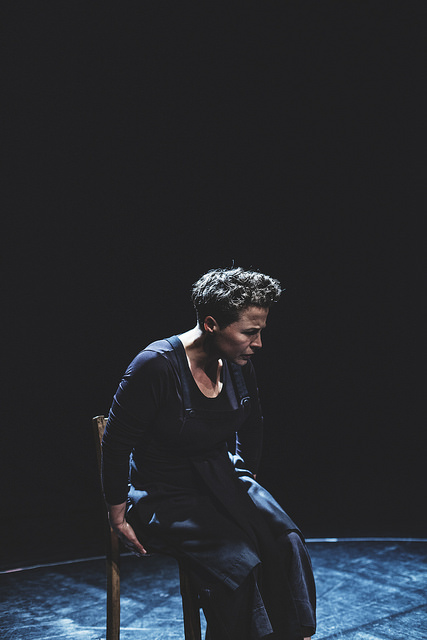Interesting. Different. Quirky. These are just some of the words I heard bandied around by the audience last night leaving the auditorium after watching The Red Chair at The Lowry Theatre's Studio space. And I have to say, in the main, I agree with them. It WAS interesting, different and quirky.
The Red Chair is a one woman tour-de-force. Not only was she the writer of last night's offering, but she was the only performer, delivering what was a 100 minute monologue, more or less non-stop!
The lady in question is one Sarah Cameron, a Dundee-born actress and performer who has written this strange but somehow compelling yarn, which, like it or not, you simply have to listen to, just to find out exactly how more bizarre the story can actually get, and how it will all end up! And let me tell you the story IS bizarre! It is fantastically surreal and surreally fantastic! Not to give too much away to those wishing to follow The Red Chair to its next location, but the story has three main protagonists all brought to life by the animate an passionate Cameron. There is a man, who turns into a chair, his wife who feeds him all manner of food known to man, and their 11 (or maybe it's 13) year old daughter.
The monologue itself is hugely poetic, with dollops of humour thrown in too. Her mastery of such self-devised tongue-twisting lists is nothing short of brilliant and hilarious. However, last night's audience were very coy and hardly raised a titter at even the funniest moments. They, like I, were actually uncertain at first as to whether or not we were watching a comedy or a melodrama, and just how complicit we were supposed to be in her strange diatribe. Even when warmed-up though by our first edible delicacy, and showered with a long rant of profanities by Cameron, majority of the audience still were uncertain how to react.
There are a few things which I didn't understand about the presentation however. The first of these was why the audience all had to wait in a queue outside the auditorium and were only let in en masse right at the very last minute making the play late in starting. There was absolutely no need for this. We are in a conventional theatre and the audience could have filtered in naturally as they do normally. It was frustrating when there was seemingly no reason behind this.
Secondly, the stage itself was bare except for a small brown wooden chair placed centre stage and a large circle of white powder on the stage floor. Why was the powder there? It was never used or referred to, nor had it any context to the text of the monologue. And why wasn't the chair painted red???
Thirdly, and this is an absolute first for me, why was the audience treated to things to eat and drink during the performance? I have been involved with live theatre for over 40 years, and have never encountered a production which stops almost mid-sentence three times whilst sweetmeats are handed out to the audience by the theatre staff. Yes, the play contained many references to food, and it was the wife who was feeding her husband constantly so that he grew fatter and fatter, but why did that justify or warrant this, pleasant and surprising as it was? I DO understand why we were given a wee dram of whisky (yes, it really was whisky. Apple juice was the non-alcoholic alternative) at the end of the play; as a way of including the whole audience in her toast to her dad. It wasn't at all necessary, but I understand the reason. I didn't understand the reason behind the food.
Further to this I have two criticisms which may or may not be avoidable. The first is that this is 100 minutes of theatre. Despite the slight respites of the food and drink, you are still seated and a party to the performance. There is no interval, and no way of leaving without it becoming obvious. It is an intimate performance by a story-teller who doesn't use microphone and likes to eyeball members of the audience. So leaving from your seat becomes a challenge. I don't think one should be made to feel like that. Audiences are used to intervals, and are certainly not accustomed to 100 minutes non-stop.
The second slight concern I should like to address is the matter of accent and dialect. I am Scottish, born and bred in Oban, and yet, somehow I still had difficulty in locking on to her brogue for the first 10 minutes or so until I became accustomed to it. There were many dialect words and at times her accent was very strong. I think, just as a suggestion, for audiences outside North-eastern Scotland, it could do to be toned down just a tad.
This production is on tour, and the final three venues for this tour are actually village halls. In my opinion, a far more appropriate setting for this type of story-telling theatre. It would probably work much better in the round too.... just a suggestion!!
Reviewer: Mark Dee
Reviewed: 12th November 2015


